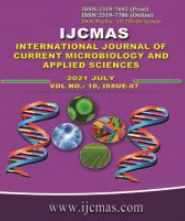


 National Academy of Agricultural Sciences (NAAS)
National Academy of Agricultural Sciences (NAAS)

|
PRINT ISSN : 2319-7692
Online ISSN : 2319-7706 Issues : 12 per year Publisher : Excellent Publishers Email : editorijcmas@gmail.com / submit@ijcmas.com Editor-in-chief: Dr.M.Prakash Index Copernicus ICV 2018: 95.39 NAAS RATING 2020: 5.38 |
The present communication depicts the detection and therapeutic management of canine hepatozoonosis. A total ten dogs of different breeds having symptoms of varying degrees of fever, emesis, anorexia etc were presented to the Department of Veterinary Clinical Complex at West Bengal University of Animal and Fishery Sciences, Kolkata 700037, India during the period from May–December 2020. Most of the infected dogs showed pale conjunctival and oral mucus membrane, peripheral lymphadenopathy and hepatomegaly. Blood was collected for hematology, serum was harvested for biochemical estimation and Giemsa stained blood smear was made for diagnosis of Hepatozoon canis from naturally infected dogs. Haematological and serum biochemical findings revealed hypohaemoglobinaemia and erythrocytopaenia and lowered PCV clearly indicating anemia, lymphocytosis, hyperbilirubinemia, hypoalbuminemia, hyperglobulinemia and increased transaminase activities accompanied by elevated level of Alkaline Phosphatase. These cases were diagnosed as hepatozoonosis since examination of blood smear revealed presence of Hepatozoon canis gamonts inside neutrophils. The affected dogs were treated with a combination therapy including single dose of Inj. Imidocarb dipropionate (6.6 mg/kg subcutaneously) and orally Tab. Doxycycline (5 mg/kg) twice daily for 28 days. Supportive therapy was given with antiemetics, hematinics and plasma expanders. Majority of the affected dogs depicted uneventful recovery after 28 days of therapeutic management.
 |
 |
 |
 |
 |